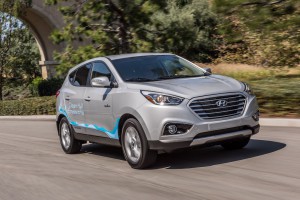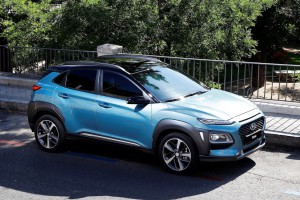
The Hyundai Tucson fuel cell model is about to get a sibling in the near term, according to Hyundai officials.
Hyundai Motor Co. is moving ahead with the launch of a group eco-friendly vehicles that include fuel-cell-powered models and a long-range electric vehicle with the capability of traveling more than 310 miles on a single charge.
Executives from the South Korean auto giant said the new fuel-cell model, now slated to debut at the Consumer Electronics Show in Las Vegas in January, will spearhead Hyundai Motor’s plans to accelerate development of low-emission vehicles.
The move is in line with Hyundai Motor Group’s renewed goal of introducing 31 eco-friendly models between its sibling automakers, Hyundai Motor and Kia Motors, by 2020.
The plans include the debut of the EV version of the Kona compact SUV, with range of about 235 miles in first half of 2018 as well as the Genesis EV model and a long-range EV, with a range of more than 300 miles. Both the Genesis EV and the long-range model will debut after 2021, according to Hyundai officials.
(Hyundai struggles as new vehicle market changes. For the story, Click Here.)
The automaker’s electric vehicle plans for the near future as well as longer term include a dedicated electric-only platform designed to challenge Tesla and other new EV companies.
The fuel-cell vehicle shown at the preview was Hyundai Motor’s second commercially produced hydrogen model and uses the company’s fourth generation hydrogen fuel cell technology. The vehicle, its capabilities and fuel-cell technologies are an evolution of Hyundai Motor’s global research, development and real-world evaluation programs.
By enhancing fuel-cell performance, reducing hydrogen consumption and optimizing key components, the vehicle’s efficiency is greatly improved compared to the its predecessor, the ix35 Fuel Cell (Tucson Fuel Cell in some markets). The new SUV boasts an efficiency level of 60%, or a 9% increase from the ix35’s 55.3%. Hyundai officials said.
(Click Here for a first look at the upcoming 2018 Hyundai Kona.)
In addition, the new model’s maximum output is enhanced by 20% compared with its predecessor, boasting an impressive 163PS of power. Cold start capability is also improved to the point where it has overcome the challenge of starting fuel-cell vehicles in temperatures below freezing point.
The vehicle’s architecture is optimized to allow it to be started at -30 degrees Celsius or 22 degrees Fahrenheit. Enhanced components – such as membrane electrode assembly and bipolar plates – also helped to reduce production costs of the fuel cell.
The development of the electric vehicle portfolio is spurred on by greater global demand for fuel-efficient, eco-friendly vehicles, the roadmap sets out the brand’s goal of leading the global popularization of hybrid vehicles, expanding its lineup to SUVs and large vehicles, Hyundai officials added.
(Hyundai rushes revised Sonata to market. Click Here for the story.)
While Hyundai continues to try develop its leadership in the electric vehicle market with its current Ioniq model, the company also aims to establish a line-up ranging from small EVs to large and luxurious Genesis-brand models. The company’s electric vehicle development will take place in multiple phases, it noted.


-30 C is not 22 F.